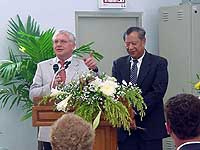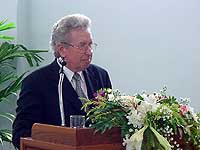- HEADLINES [click on headline to view story]:
-
Getriebe Schaefer opens plant on Eastern Seaboard
-
TEI targets 20 distribution centers in 2002
-
VAT maintained until September
-
Economic stimulus begins to bear fruit
-
Households uncertain about economic direction
-
Senators to support Thai-Malaysian gas project
-
Government recalls shrimp and poultry exports
|
|
Getriebe Schaefer opens plant on Eastern Seaboard
March 19 marked the official opening of Getriebe
Schaefer GMBH Ohorn’s latest plant in Thailand. Dignitaries from the
German embassy, the Ministry of Industry and representatives of other
industrial companies attended the opening ceremony.
 Walter
Kretschmar (left) and Narong Ratana (right), the directors of the
Thai-German Institute, assured Getriebe Schaefer of strong support and
cooperation from TGI. Walter
Kretschmar (left) and Narong Ratana (right), the directors of the
Thai-German Institute, assured Getriebe Schaefer of strong support and
cooperation from TGI.
The morning started with the monks blessing, followed
by a speech from Dr. Gunter Schaefer, the managing director, who shared
some insight on the family company that started back in 1873 when
locksmith Carl Heinrich Schaefer originated a company manufacturing
textile machines in the beautiful small village of Ohornin East Saxony.
After the early death of the founder his son Max
Schaefer took over the small firm and enlarged it and later initiated the
use of toothed gears which was the birth of manufacturing gear
transmission in the firm.
 Dr.
Gunter Schaefer Dr.
Gunter Schaefer
At present Dr. Gunter Schaefer runs the firm as the
managing director, currently investing largely in the large equipment for
turning, cutting, hardening, grinding and casting machines. The delivering
program includes spur gears, bevel gears, planetary gears, and slewing
gears, to name just a few.
Narong Ratana and Walter Kretschmar, the directors of
the Thai-German Institute, which was the major provider of Getriebe
Schaefer Thailand’s start up workforce, gave their congratulatory
speeches, assuring the company of the strong support and cooperation from
TGI.
Christiane Koenig, the first secretary of Economic and
Commercial Affairs from the Embassy of the Federal Republic of Germany was
the guest of honor. She was joined by the deputy permanent secretary to
the minister of industry, Surachai Thaluengchok in the ribbon cutting
ceremony.
The ceremony was concluded by the final blessing from
the patriarch placing the holy gold leaf upon the entrance, which
represents eternal prosperity.
TEI targets 20 distribution centers in 2002
TEI, TNT’s domestic division has introduced a new
fleet of vehicles to support its expansion target of 20 distribution
centers around the country before the end of the year. TEI, set up only 2
years ago, now has a fleet of 70 vehicles and operates a rapid response
distribution network throughout the country.
With nine offices at present in Thailand, the company
plans to open another eleven offices this year. TEI presently operates to
every postal code in the country and the new fleet will support
enhancements such as better connectivity to Phuket and Phangna on the
Southern Route.
Managing director of TEI Bob Turner says, “Our
costumer base is increasing rapidly and the additional fleet will make up
faster and more cost effective to even more destinations than before. The
vehicles built by Tri Pethc Izuzu Sales are tailor-made to TEI’s
specific requirements and are fitted with special door locks, safety nets
and global positioning system units.”
TEI’s service is IT driven and customers are provided
with real-time reports on shipments and comprehensive feedback reports on
performance.
VAT maintained until September
The government will maintain the value added tax (VAT)
of consumers’ products at 7% until at least September 30 before making a
decision whether the lower VAT policy should be continued, according to
deputy finance minister Varathep Ratanakorn.
After that the Ministry of Finance will consider and
decide on the percentage on a year-to-year basis, depending on updated
economic data.
Varathep pointed out that increasing VAT to 10% would
lead to falling net incomes and lower domestic consumption while raising
prices of consumer products. (TNA)
Economic stimulus begins to bear fruit
The government’s economic stimulus packages,
implemented over the past year, have begun to show results according to
deputy prime minister and finance minister Somkid Jatusripitak. Somkid
said that the government’s economic stimulus packages have been showing
concrete results since the fourth quarter of last year.
This is witnessed by the country’s economic growth
rate in the quarter, which jumped to 2.2% of the gross domestic products
(GDP), from an earlier projection of no more than 1%, he pointed out. The
economic growth has continued during the first quarter of this year.
“If we can maintain the satisfactory growth trend, I
believe our country’s economic growth this year will be over 3% of GDP,
up from the earlier projection of 2%”, Somkid said.
Somkid added that the higher growth rate in the fourth
quarter of last year was due to improved internal factors and confidence
of foreign investors in the Thai economy.
The country’s economic prospect this year will be
further boosted by a global economic recovery led by the U.S. economy and
continued results of the present government’s economic measures.
The Office of the National Economic and Social
Development Board (NESDB) has forecast that the Thai economy will grow
2-3% this year, instead of 1.3-1.7% as projected earlier, due not only to
increased private investment but also an increase of domestic consumption.
(TNA)
Households uncertain about economic direction
Most households remain uncertain about the economic
direction in the first quarter of this year, according to a poll by
Assumption University or ABAC Poll. The survey was conducted on
“Household Economic Conditions in Quarter 1/2002 and Economic Confidence
among Household Heads with a random sample of 5,299 households nationwide
during February 15-March 21.
The poll found 53.5% said their household income
remained unchanged and 34.7% said the income declined. Asked about the
economic conditions of the country in the past few months, only 17.2
viewed they had improved while 39.9% said they had worsened with 42.9%
seeing it remain stable.
Most were pessimistic about the economy because oil and
consumer product prices continued to rise, farm product prices dropped,
and more workers were made redundant and corruption remained in
bureaucracy.
The survey showed 43.2% saw unemployment as higher this
year while 23.9% said it remained the same. Asked whether it is
appropriate now to buy new cars or houses, 88.8% said it was not the right
time to do that until the next 1-2 years.
Asked about confidence in the current government’s
measures to stimulate the economy, 27.6% said they were rather confident
while 10.2% were uncertain with 32.1% rather uncertain. The poll found
48.4% said they were satisfied with the living conditions of their
families. (TNA)
Senators to support Thai-Malaysian gas project
Over 160 senators signed a petition to show their
support of the Thai-Malaysian gas pipeline project. The list of the 163
senators’ signature will be submitted to Prime Minister Thaksin
Shinawatra.
Senator Kamnuan Maohprasit from the northeastern
province of Uttaradit, who collected the senators’ signatures, said that
he considered the transnational gas pipeline project vital to make
Thailand’s supply of energy secure. He stressed that energy is
fundamental to the Kingdom’s development and will help increase future
income for the population. He said that opposition to the project is
irrational.
“The opposition has not only delayed the project,
which has promising prospects with anticipated advantages to the Thai
economy, but has also affected the country’s image and confidence in the
Thai economy among investors,” he cautioned.
“The petition will be presented to the PM and
represents a message calling for the government to expedite the
Thai-Malaysian pipeline project,” he said.
Senators Prasit Phitoonkijja and Ubol Ua-sri from the
northern province of Nakhon Sawan and the northeastern province of Nakhon
Ratchasima respectively also helped collect the signatures. Senator
Kamnuan and Ubol said that they believed impacts on the local environment,
if any, could be appropriately addressed.
Villagers of Chana District in the southern province of
Songkhla, where part of the pipeline project will be put on-shore, have
strongly opposed the project, saying it will affect their way of life and
damage the local environment. (TNA)
Government recalls shrimp and poultry exports
The government has ordered that all exports of Thai
shrimps and poultry on their way to the European Union (EU) be recalled
for re-inspection to assure buyers that the products contain no harmful
chemical residues.
According to deputy prime minister and finance minister
Somkid Jatusripitak the instruction followed a recent claim by EU that
harmful chemical residues were detected in the Thai products.
Somkid said that a committee, chaired by Sompol
Kiatpaibul, one of his advisors, was also authorized to monitor imports of
chemicals and antibiotics used in the agricultural sector. “The
committee will, from now on, approve imports of chemicals and antibiotics
used in the farm sector on a case-by-case basis at the request of the
Ministry of Public Health,” he said.
Although exports of Thai shrimp and chicken to EU
account for only US$101 million, and US$360 million a year respectively,
the tightened rules were aimed at protecting the country’s overall food
exports, worth US$ seven billion a year, as other major food importing
countries, namely the United States, might follow the EU in banning the
Thai products if no actions were taken to reassure buyers.
Meanwhile, the Thai Frozen Food Association said that
it would comply with the government’s decision on recalling the products
for re-inspection, as it would be good for the industry in the long run.
Chemicals and antibiotics banned in the EU include
aristtolochia spp, chloranphenical, chloroform, chlorpromazine,
colchicines, dapsone, dimetridazole, nitrofurans (including furazolidone),
metronidazole and ronidazole; while those banned in the U.S. are
chloranphenical, chenbuterol, diethylstilbestrol, dimetridazole,
ipronidazole, other nitroimidazoles, furazolidone, nitrofurazone, other
nitrofurans, sulfonamide drugs in lactating dairy cattle (except approved
use of sulfadimethoxine, sulfabromomethazine and sulfaethoxypyridazine),
fluoroquinolones and glycopeptides. (TNA)
|
|
|
|
News | Business News | Features | Columns | Letters | Sports | Auto Mania
Kid's Corner | Who’s Who | Travel | Our Community | Dining Out & Entertainment
Social Scene | Classifieds | Community Happenings | Books Music Movies
Club in Pattaya | Sports Round-Up
E-mail: [email protected]
Pattaya Mail Publishing Co., Ltd.
370/7-8 Pattaya Second Road, Pattaya City, Chonburi 20260, Thailand
Tel.66-38 411 240-1, 413 240-1, Fax:66-38 427 596
Copyright © 2002 Pattaya Mail. All rights reserved.
This material may not be published, broadcast, rewritten, or redistributed.
|
|
|
Correction
Pattaya Mail incorrectly
published that Waste Management Siam was a subsidiary of Waste
Management Inc. of the USA. In fact, Modern Asia Environmental
Holding Inc. (MAEH) is the parent company of Waste Management
Siam Limited (WMS), Eastern Seaboard Environmental Complex
Co., Ltd. (ESBEC) and Modern Asia Environmental Limited (MAE).
The main shareholder is the Global Environment Fund, a private
equity fund from Washington D.C. Waste Management Inc. of the
USA has no ownership in any of these companies or
subsidiaries. |
|

 Walter
Kretschmar (left) and Narong Ratana (right), the directors of the
Thai-German Institute, assured Getriebe Schaefer of strong support and
cooperation from TGI.
Walter
Kretschmar (left) and Narong Ratana (right), the directors of the
Thai-German Institute, assured Getriebe Schaefer of strong support and
cooperation from TGI. Dr.
Gunter Schaefer
Dr.
Gunter Schaefer